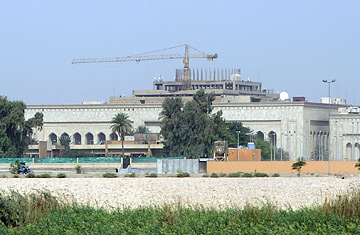
The U.S. Embassy under construction in Baghdad, October 2007.
If you're a Foreign Service officer thinking of volunteering for Iraq, consider the following: State Department employees serving in Iraq get their full salary plus 70% differentials for danger and hardship service. Got a family living in, say, western Europe as part of your last assignment? No problem. The State Department says they can stay there in housing provided by the government as you serve in Iraq. Or, if you like, move the family to a U.S. location of your choice with an allowance that comes on top of the other financial incentives. And for those Foreign Service strivers thinking of a posh future post in some place like London, Paris or Madrid, keep in mind that State Department employees who volunteer for Iraq are now guaranteed one of their five top picks for the next assignment following Iraq. And the U.S. embassy and Baghdad definitely wants you to know that Iraq duty will do you well in promotion consideration down the road.
The U.S. embassy in Baghdad is pressing a hard sell to fill roughly 48 positions with start dates in the summer of 2008. The State Department recently took the unusual step of warning more than 200 officers at its Washington headquarters that they may be forced into compulsory Iraq service unless enough brave souls step forward. Baghdad embassy officials say that since then 15 individuals have volunteered, leaving about 33 spots to be filled.
It remains to be seen how many more State Department employees sign on. But Deputy Chief of Mission in Baghdad Patricia Butenis, who oversees embassy staffing, says widespread perceptions about life in Iraq do not match reality. Some seem to think that life at the U.S. embassy in Baghdad is a bunker existence. To be sure, rockets and mortars have fallen in the Green Zone, and at least three State Department employees have died in Iraq. But, according to embassy officials, diplomats in Iraq head for cement bunkers less often lately, thanks to a drop in violence around Baghdad and elsewhere in the country. "There are people who think it's constantly a barrage of mortar and rocket attacks," says Butenis, who began her Foreign Service career in Pakistan shortly after the U.S. embassy there was torched there in 1979. "It's really not that way all the time."
Also, the new embassy compound will make life for diplomats in Iraq much more comfortable when it opens next year at a date still to be determined. Currently many State Department personnel in Iraq live in trailers surrounding Iraq's Republican Palace, a working mansion of roughly 300 rooms retrofitted to accommodate the U.S. embassy's temporary residence and elements of the American military command. The new embassy facility will have recreation facilities and apartment-style housing in buildings built to withstand any falling bombs. "We will have kitchens," said U.S. Economic Minister Ambassador Charles Ries, who spoke to reporters about the staffing issue alongside Butenis.
"You will have a kitchen," Butenis assured potential volunteers. There was one drawback. "There are no trees over there, whereas we've got trees here," said Ries, referring to the current trailer park lodgings at the Republican Palace. "So there's not much shade."
